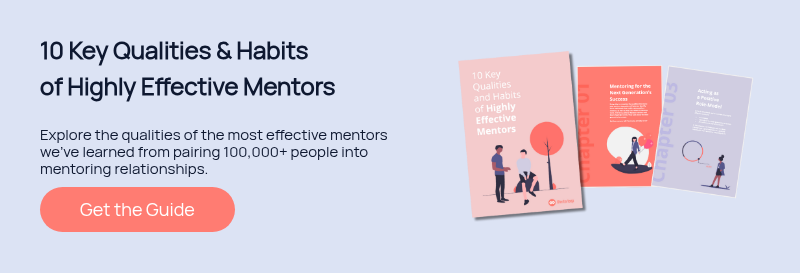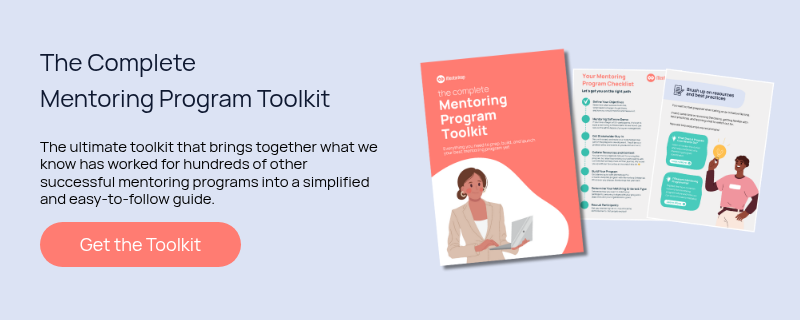Why People Worry About AI in Mentoring
Artificial intelligence is transforming nearly every industry, and mentoring is no exception. With 65% of coaching professionals believing AI will significantly reshape their field, it’s natural to wonder if AI might one day replace human mentors.
This fear often stems from the idea that AI’s data-driven insights and automation could make human wisdom less relevant in guiding growth and development. But is AI really a threat to the human touch? Or is it simply a tool to enhance the mentoring experience?
These are the questions business leaders and coaching experts are exploring. While AI adoption grows, so too do conversations about ethics, bias, and, most importantly, how to strike the right balance between technology and human connection.
Human Wisdom Still Matters
Human wisdom is rooted in lived experience, emotional intelligence, and intuition — things AI can’t fully replicate. While AI can analyze patterns and suggest options, it lacks the empathy and nuance that mentors bring.
Geneviève Houriet Segard, Adjunct Director at EDHEC NewGen Talent Centre, puts it simply: “Human mentorship and guidance still play a crucial role, and likely will for years to come.”
Great mentors don’t just transfer knowledge; they provide encouragement, create safe spaces, and share stories that resonate. These are the elements that help mentees build confidence and resilience — areas where AI cannot compete.
AI ≠ A Robotic Mentor, It’s a Support System
Rather than imagining AI as a “robotic mentor,” it’s more accurate to see it as a support system. In fact, 80% of business leaders have already used generative AI as a business mentor, leveraging its ability to provide quick advice and resources.
AI tools can:
- Recommend development resources
- Track mentee progress
- Suggest learning paths
- Surface insights for mentors and coordinators
This frees mentors to focus on what really matters: connection, empathy, and guidance.
Could this change how mentoring programs are structured? Absolutely. But the goal isn’t to replace mentors — it’s to empower them. Together, AI and humans can create mentoring experiences that are both scalable and deeply personal.
The Real Role of AI in Mentoring Programs
AI is already reshaping how organizations connect mentors and mentees, manage programs, and measure impact. Its role isn’t to push humans aside but to make mentoring more effective and accessible.
Smarter Matching
Matching the right mentors and mentees is one of the toughest parts of running a program. AI can analyze skills, goals, availability, and even personality traits to create stronger, fairer matches.
Organizations using AI-powered mentoring platforms have seen program success rates increase by up to 30% — proof that better matches create better outcomes.
Admin That Runs Itself
Coordinators often juggle endless scheduling, reminders, and feedback forms. AI can automate these routine tasks so coordinators spend less time chasing spreadsheets and more time supporting people.
With Mentorloop, features like automated scheduling nudges, progress tracking, and digest reporting take care of the heavy lifting. That means programs can scale without losing their human heart.
Insights That Prove Impact
AI-powered analytics turn feedback and engagement data into clear insights. Leaders can see what’s working, identify gaps, and demonstrate impact to stakeholders.
The Association for Talent Development highlights benchmarks for evaluating AI-driven mentoring platforms, a reminder that programs succeed when they can measure, adapt, and grow.
Where Humans Shine (and Always Will)
For all the promise AI brings, there are qualities that only people can deliver, and they’re the very reasons mentoring works in the first place. Technology can assist, but it can’t replace the magic of human connection.
- Emotional intelligence & intuition
Great mentors know how to read between the lines. They pick up on tone, body language, and those unspoken worries that no algorithm could detect. - Empathy & storytelling
Mentors share lived experiences: the career highs, the stumbles, and everything in between. These stories build trust and inspire mentees in a way data alone never could. - Context & nuance
Every workplace has its quirks, every career path its twists. Human mentors bring cultural awareness and an understanding of personal circumstances that AI simply can’t interpret. - Authenticity
Advice lands differently when it comes from someone who’s walked a similar path. That sense of “they get me” can’t be manufactured by a machine. - Motivation & accountability
Mentors don’t just set goals with mentees — they cheer them on, challenge them, and hold them accountable. It’s the relationship that drives commitment and growth.
At its heart, mentoring has always been about people helping people. AI can clear the path, bring in resources, and keep things moving, but it’s the human connection that gives mentoring its power, and that’s something technology will never replace.
Better Together: How AI + Humans Elevate Mentoring
When used thoughtfully, AI and human mentors complement each other beautifully.
AI as a Knowledge Amplifier
Mentoring has always been about passing down experience, skills, and perspective. What AI brings to the table is scale and efficiency. Instead of relying solely on a mentor or program coordinator’s capacity or resources, AI makes mentoring knowledge more accessible and personalized.
Resource Recommendations: Like a research assistant, AI can surface articles, toolkits, or learning modules tailored to a mentee’s goals, so they get just-in-time support without having to search endlessly.
Conversation Starters & Prompts: For mentors who aren’t sure how to guide the next meeting, AI can generate discussion topics and reflective questions, ensuring no session feels wasted.
Program-Wide Insights: Coordinators gain a bird’s-eye view of where mentoring pairs are thriving or struggling, allowing them to direct human support where it’s needed most.
Rather than replacing human wisdom, AI amplifies it, extending the reach of each mentor and the impact of each program resource, so participants get more value out of every interaction.
Guiding and Documenting the Mentoring Journey
Another powerful way AI supports mentoring is by helping participants stay focused and accountable throughout their journey. Instead of mentors and mentees wondering “What should we talk about next?”, AI can generate tailored meeting agendas that keep conversations on track and aligned with program goals.
By suggesting topics, structuring sessions, and prompting reflection based on previous meeting notes, AI ensures mentoring relationships progress with purpose. At the same time, automatic documentation makes it easy for participants (and program coordinators) to look back on the journey, see progress, and measure impact.
With tools like Mentorloop’s AI-powered agenda generation, mentors and mentees don’t just meet, they build momentum.
Reducing Admin, Boosting Relationships
By automating scheduling, reminders, and reporting, AI gives mentors and coordinators more time for people-focused work. With 70% of coaching organizations already using AI in their services, this shift is clearly proving valuable.
WIFI Talents reports AI adoption is accelerating — reinforcing its role as a support, not a substitute.
The Future of AI-Enhanced Mentorship
Looking ahead, the most successful mentoring programs will embrace a hybrid model: AI handles scale and efficiency, while humans provide authenticity and connection.
Building Hybrid Models
Hybrid programs use AI for matching, data insights, and admin, while mentors deliver empathy, encouragement, and wisdom. This model makes mentoring more inclusive and scalable without losing its human heart.
Self-directed learning pathways, personalized by AI but guided by mentors, are one example of this synergy in action.
Preparing Mentors for AI
As AI becomes more common, mentors need support to use these tools effectively. Training can help them interpret AI insights, maintain ethical standards, and balance tech with human connection.
With 84% of early career graduates finding AI tools helpful for career advice, demand for AI-augmented mentoring will only grow. HR Magazine shows this trend is already well underway.
Final Thoughts
AI isn’t here to replace mentors; it’s here to make them stronger. By automating admin, improving matching, and surfacing insights, AI frees mentors to focus on empathy, wisdom, and human connection.
The future of mentoring is hybrid: AI as the backbone, humans as the heart.
Embrace the Hybrid Future with Mentorloop
Ready to harness AI to supercharge your mentoring programs? Mentorloop makes it simple!
Book a demo today and see how Mentorloop helps you build mentoring programs that are scalable, measurable, and deeply human.






